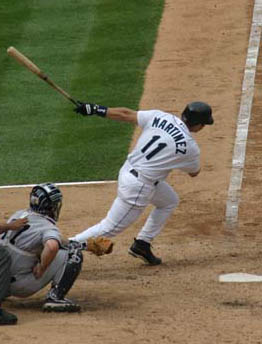Today at The Hardball Times I used Bayesian analysis to predict the Hall of Fame voting results:
We have some clues as to what will happen today. Ryan Thibodaux and his fine team of folks at bbhoftracker.com scour the Internet for Hall of Fame ballots and post the results on their site for all to see. The problem is that through Monday, only 217 ballots are known, approximately 53 percent of the total. Basing conclusions off this limited data set is fraught with peril.
Or is it? Bayesian analysis provides a way to estimate results based on incomplete data sets like these. The technique combines observed data with prior expectations to produce a posterior probability distribution. As you observe more data, you update the posterior distribution. In this way, predicting Hall of Fame voting results is like watching a player hit—you start with how good you think he is and update that expectation as you watch him perform at the plate.
Who are the likely inductees? Read more here.
(Photo from biomed3 on Flickr)
